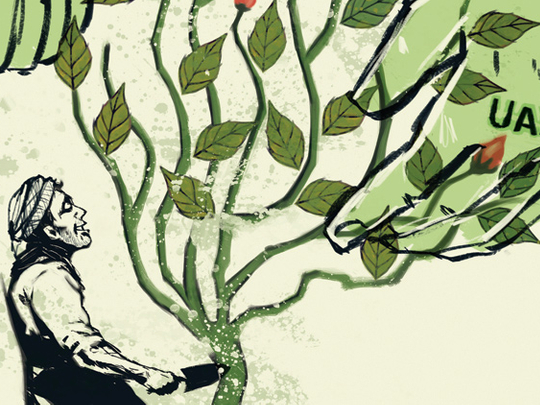
The root of the problems that led to the deterioration — and degradation — in the so-called “Arab spring” countries lies in the dismally low growth rates, declining job opportunities and high inflation.
This was what prompted the UAE to announce an initiative three years ago to support economic stability in the Arab region. The initiative comprises five main themes that concentrate on sweeping economic and financial reforms to support stability and lead to the development of the financial sector. Furthermore, these would pave the way for stability in raw material prices as well as pump up exports through the financing of overseas trade.
The UAE initiative, characterised by a comprehensive approach, can activate positive changes in Arab economies and eventually help ease the tense economic situation. Concomitantly, there would be gains for the broader economies by way of improved growth and the creation of optimum job opportunities.
The UAE has expressed its readiness to contribute to the funding of dozens of development projects in the Arab world and in other developing countries, especially through the Abu Dhabi Fund for Development.
This has given strong impetus and can contribute to the resolution of social issues and arrest the steady decline in the region for almost four years. It is imperative for all Arab countries to create the conditions to ensure the fund flow will meet its desired goals.
Since the UAE initiative has an economic, social and human dimension, and all the more credible because it comes from a e country with a rich development experience of sustained high growth rates over decades. Not just that, the UAE has been able to diversify its economy and firmly place itself on the global economic map in a relatively short span of time.
Unlike GCC economies which have maintained average growth rates of 4.7 per cent, those in the wider Arab world have been characterised by fragility during the past three decades.
The other Arab economies have seen declines in real growth rates coupled with an increase in public debt as a percentage of GDP. There are up to 17 million people who are jobless, and has been on the rise among the young.
Attainable targets
Undeniably, the Emirati initiative can have attainable targets. To ensure this is so, work has to be taken up on three approaches simultaneously. The beneficiaries must create conditions to diversify the economic and financial sectors.
They must set plans in place for the implementation of development programmes in each Arab country through joint local and foreign funding, such as the Arab Fund for Economic and Social Development. (This entity had funded 499 projects worth $27.9 billion by the end of 2012.)
An upturn in joint Arab projects can play a major role in stoking growth, the creation of job opportunities and support greater Arab economic integration.
At the same time, Arab countries receiving the aid have great potential to provide food commodities at reasonable prices and help sustain food stability and security. There are vast untapped lands in Arab countries such as Sudan where water is available and only need the funding and technical knowhow to produce a variety of food items in significant quantities.
The Gulf funds can contribute to this, given that there is a strong approach on their part towards investing in agricultural projects. But there is a need for infrastructure in Arab countries that can make full use of such investments.
For better growth rates and jobs, it is necessary to develop exports and finance foreign trade. In view of the globalisation of markets amid stiff competition, there is great potential for higher export volumes.
The inter-Arab trade Financing programme of the Arab Monetary Fund can contribute effectively, and it’s high time it did so given the limited role it has played in the 25 years since its establishment.
The UAE has laid down the road map to find solutions to some of developmental issues in Arab countries. If these are not resolved, things can only worsen and have grave consequences on regional stability. These states must also keep in mind that failure will leave an unwanted legacy for future generations.
— Dr Mohammad Al Asoomi is a UAE economic expert and specialist in economic and social development in the UAE and the GCC countries.












